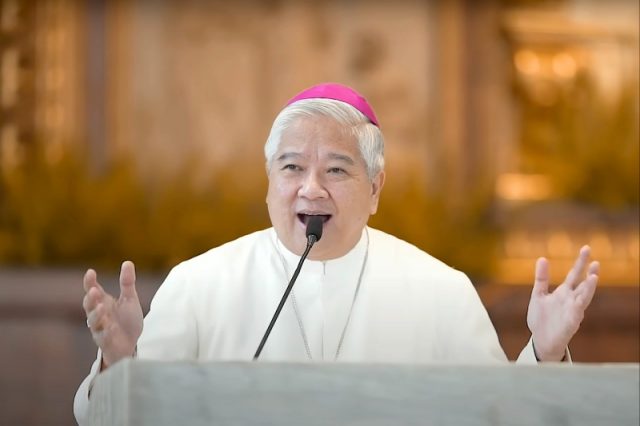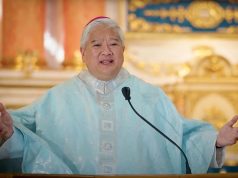It is better to take refuge in the LORD,
than to trust in princes!
Psalm 118:9
A Pastoral Commentary on the 2025 National Budget
My brothers and sisters in Christ in the Church of Lingayen Dagupan:
Why this commentary on the national budget?
In Deus Caritas Est, Pope Benedict XVI laid out the proper part of the Church in respect to the ordering of human society.
The Church’s social teaching argues on the basis of reason and natural law, namely, on the basis of what is in accord with the nature of every human being.
It recognizes that it is not the Church’s responsibility to make this teaching prevail in political life. Rather, the Church wishes to help form consciences in political life and to stimulate greater insight into the authentic requirements of justice as well as greater readiness to act accordingly, even when this might involve conflict with situations of personal interest.
Building a just social and civil order, wherein each person receives what is his or her due, is an essential task which every generation must take up anew.
As a political task, this cannot be the Church’s immediate responsibility.
Yet, since it is also a most important human responsibility, the Church is duty-bound to offer, through the purification of reason and through ethical formation, her own specific contribution towards understanding the requirements of justice and achieving them politically. (n. 25)
Our country starts a new fiscal year – and with it, a new budget passed by the Legislature as the National Appropriations Act. It is my understanding that the function of Congress is to legislate the national budget into law, and the role of the Executive is to implement it. The Constitution grants the President the power to veto either the budget as a whole or such line items as he may find repugnant to sound public policy and to the welfare of all.
As your Archbishop, I admonish you to study diligently, judge critically and act with vigilance on the moral concern of the 2025 national budget. It is a grave social matter.
FIRST, the Bi-Cameral Conference Committee, tasked with formulating a compromise between the bills passed by the House of Representatives and the Senate, seems to have over-reached its power and, in the view of some experts in constitutional law, has in fact acted as a third chamber of Congress, more powerful than either the Lower and the Upper Houses, because it is the version it drafts that is eventually passed into law.
The reason that this is a moral concern is that the budget is an issue of what Catholic social teaching calls “distributive justice” – the fair, reasonable, equitable distribution of the nation’s resources, as well as its burdens. And to be truly the result of a democratic process, what is passed into law must be drafted by the common consensus of the people’s elected representatives scrutinizing, debating and voting as the people’s representatives – rather than by a select group that is not fairly representative of the general population.
Democratic consensus, the Second Vatican Council teaches, is a moral necessity insofar as justice is the aim of governance. In Gaudium et Spes, the Council taught:
Economic development must remain under man’s determination and must not be left to the judgment of a few men or groups possessing too much economic power or of the political community alone or of certain more powerful nations.
It is necessary, on the contrary, that at every level the largest possible number of people and, when it is a question of international relations, all nations have an active share in directing that development.
There is need as well of the coordination and fitting and harmonious combination of the spontaneous efforts of individuals and of free groups with the undertakings of public authorities. (GS, 65)
Regretfully, the Bi-Cameral Conference Committee is perceived by many to have acted as clique of interested individuals who were not representative of popular concerns and interests.
SECOND, I am troubled by the fact that PhilHealth was not allocated any amount. I have sought enlightenment from those in the know on this matter, and, while it seems that those insured – who, under the concept of “universal health care” ought to include every Filipino – will still be able to enjoy the benefits this system of health insurance guarantees, still, Congress would have done well to increase both the extent as well as the coverage of benefits. I have been told that one of the reasons for this development was PhilHealth’s poor “absorptive capacity” – which simply means that it did not spend enough! This is appalling because there are so many who suffer and die without the benefit of competent medical care and effective medicines because of poverty – and yet, a government agency tasked with ensuring that health services are available especially to those who cannot afford, has been sluggish in expending resources for those in greatest need.
No matter the promising signs of economic growth of which the government boasts, there can be no true progress when such an important dimension of public life as health is not justly addressed. St. Pope Paul VI in Populorum Progressio taught:
The development we speak of here cannot be restricted to economic growth alone. To be authentic, it must be well rounded; it must foster the development of each man and of the whole man.
As an eminent specialist on this question has rightly said: “We cannot allow economics to be separated from human realities, nor development from the civilization in which it takes place.
What counts for us is man—each individual man, each human group, and humanity as a whole.” (PP,14)
THIRD, it is dismaying that the budget for the Department of Public Works and Highways, an agency of government that, in the past, was repeatedly excoriated for incidences of graft and corruption, is higher than the allocation for education – despite the clear Constitutional provision that education ought to enjoy the highest budgetary priority.
True, in the National Expenditure Program (NEP), education was assigned a higher allocation by the Executive Branch, but legislators introduced into the final form of the budget appropriations for projects which, I can only surmise, serve principally to curry favor from voters, especially as we face mid-term elections!
FOURTH, we must ask why Congress, through the Bi-Cameral Conference Committee, cut deeply into the allocations for social services and economic services – including agrarian reform and agriculture. Farmers are a beleaguered lot in our country. Their fortunes are bound to the uncertainties of weather and climate, as well as to man-made burdens such as the uncontrolled importation of agricultural goods that cause the prices of farm-products to hit rock-bottom!
While we are witnesses, even now, to the prodigal spending of politicians seeking re-election, our farmers must sink deeper into debt in order to produce what little they can from the soil, to sell them to middlemen who pay for them at the lowest prices possible and sell them at the highest prices they can command. This is the structural injustice about which the Church cannot be silent.
St. Pope John Paul II, on the 100th anniversary of Leo XIII’s Rerum Novarum, issued an encyclical of his own, Centesimus Annus, in which he urged government to exercise a more active – in fact, forceful part in vindicating the rights of the downtrodden.
The State has the further right to intervene when particular monopolies create delays or obstacles to development. In addition to the tasks of harmonizing and guiding development, in exceptional circumstances the State can also exercise a substitute function, when social sectors or business systems are too weak or are just getting under way, and are not equal to the task at hand.
Such supplementary interventions, which are justified by urgent reasons touching the common good, must be as brief as possible, so as to avoid removing permanently from society and business systems the functions which are properly theirs, and so as to avoid enlarging excessively the sphere of State intervention to the detriment of both economic and civil freedom. (n. 48)
Political squabbles only distract government from what it should be doing to better the lot of those who already suffer. The visitations of various calamities this year have further impoverished our people. Before the writing on the wall spells out condemnation, government must act, act decisively and act justly.
But, as this is the Jubilee of Hope, our hope is in God. “It is better to trust in God than to trust in princes”…this is the wisdom of Sacred Scripture, and it is the foundation of our hope.
But since we are called upon to cooperate with God’s plans for the world, I call upon our leaders, in the name of God, to do what is right and just, beneficial and promising for our people.
In the name of God, do what is right and just!
Sa ngalan ng Diyos, bayan muna bago ang sarili!
In the name of God resist the culture of corruption and graft!
From the Cathedral of Saint John the Evangelist, Dagupan City, January 15, 2025
+SOCRATES B. VILLEGAS
Archbishop of Lingayen Dagupan










